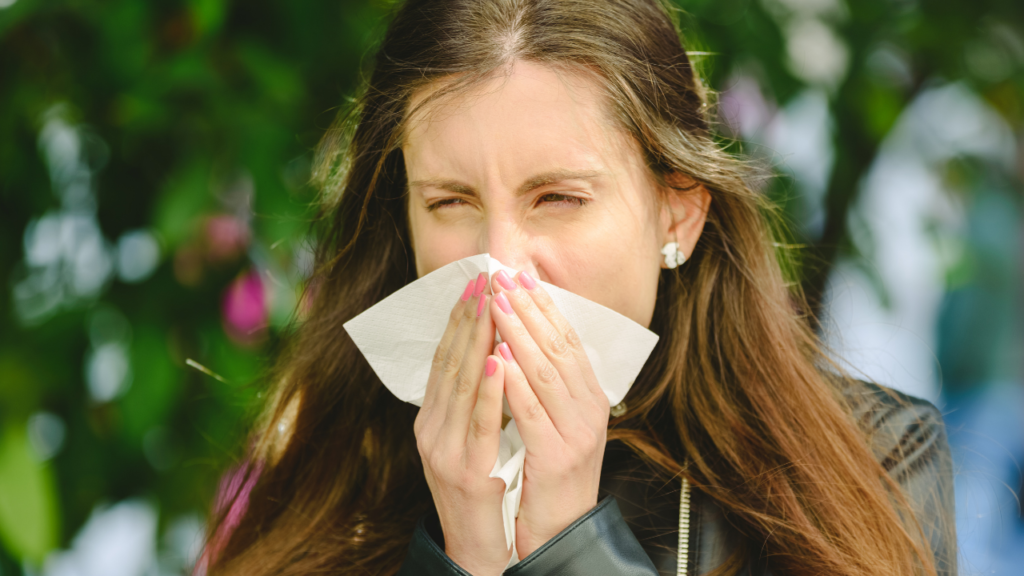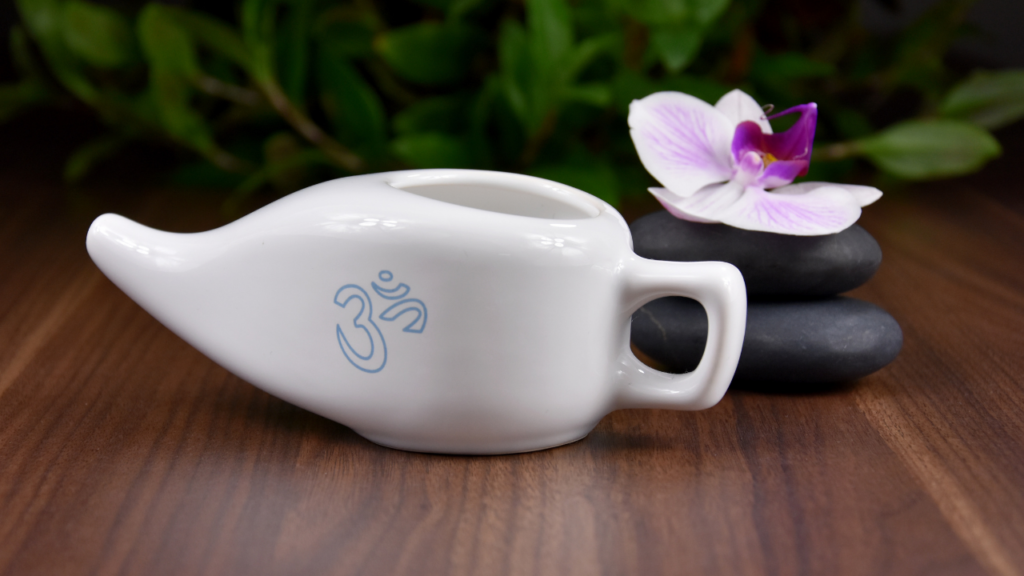Table of Contents
Exercise Daily – You may experience loss of taste for a number of conditions, but the question is can allergies cause loss of taste too? Well, it’s not unlikely!
Various medical diseases, including allergies, COVID-19, and upper respiratory infections, may manifest themselves as a loss of taste and smell. This symptom may also occur as a result of some neurological disorders, such as Parkinson’s disease, multiple sclerosis, and Alzheimer’s.
Although you may have symptoms in addition to your loss of taste and smell, these symptoms may provide a hint as to the underlying cause of your condition. In this post, you will learn more about the loss of taste and smell caused by allergies. Moreover, we will talk about how to treat these symptoms.
How Can Allergies Cause Loss of Taste and Smell?
Allergies may cause a loss of smell (anosmia) and a loss of taste (ageusia), among other symptoms. These two senses are very intertwined. The beginning of your sense of smell occurs when microscopic particles reach nerve endings located high up in your nose.
As a result, your nerves transmit signals to your brain, which then decides what fragrance you are smelling.
The capacity to thoroughly taste anything also depends on your sense of smell. In the process of chewing food, scents release through the roof of your mouth and into the nostrils.
The neurons in your nose sense these fragrances and interpret the information. This improves the taste of the meal you are eating. If your sense of smell is impaired, your sense of taste will be adversely impacted.
As a result of your body mistakingly attacking harmless things that enter your body, allergies might develop. Pet dander, pollen, mildew, dust, and other environmental triggers are examples of these chemicals.

The question is, how can allergies cause loss of taste? It’s because of the allergens. Let’s talk about allergens and what they do!
All substances that have the potential for triggering allergies are collectively referred to as allergens. Your immune system secretes substances that cause allergy symptoms such as the ones listed below:
- Runny nose
- Congestion
- Sneezing
- Coughing
- Wheezing
- Rashes on the skin
- Fatigue
- Headache
- Itchy eyes and nose
Nasal congestion is the source of the loss of smell and taste associated with allergies. It is impossible to breathe via your nose if particles are unable to reach the nerves in your nose. It prevents the information from reaching your brain and vice versa.
This is also the reason why your sense of taste usually hampers as well.
How to Identify the Source of Smell and Taste Impairment
Without a doctor’s visit, it might be difficult to pinpoint the source of your loss of smell and taste. However, there are several indicators that may suggest whether it is connected to your allergies.
Having allergies causes more than simply a loss of smell and taste; it causes a variety of symptoms. Aside from that, allergy symptoms might linger for many months or come and go with the changing of the season.
Other ailments, on the other hand, tend to endure for a shorter period of time. It is usual for upper respiratory infections to persist for around one week. Fever is also a sign of several illnesses, but it is not a symptom of allergies.
Is it COVID-19, or something else?
COVID-19 is characterized by symptoms such as loss of smell and taste. Fever, chills, headaches, and body pains are some of the other symptoms of COVID-19. However, doctors do not associate these symptoms with allergies.
Other Causes of Loss of Taste
Although we know how can allergies cause loss of taste, it’s not the only reason. Allergies and respiratory disorders aren’t the only things that might cause a person to lose their sense of taste. Among the other reasons are:
Drugs
There are hundreds of drugs that might impair your ability to taste and smell. So, one has to be cautious while using them. While some of them have a metallic or bitter taste of their own, others interfere with your body systems.
Hence, the capacity to appropriately process sensory information – such as taste and smell impairs.
Smoking
Smoking cigarettes might have a detrimental impact on your sense of smell as well as your capacity to taste food. It is possible that these alterations are more severe in smokers since they linger longer and occur more often.
Treatments for Cancer
If you are undergoing cancer treatment, your senses of smell and taste may be significantly impacted.
When you undergo chemotherapy, your sense of smell and taste buds may become more sensitive. However, these side effects should subside in about three months after treatment is over.
Particularly if your cancer is in your head or neck, radiation therapy may cause you to lose your sense of smell and taste. If your taste buds are destroyed, the changes you experience may be permanent.
Regaining Smell and Taste Sensations
There are a variety of therapies available to assist in the relief of allergy symptoms. If you know how can allergies cause loss of taste and smell, you will know how to treat them as well.
Some medications work by targeting your immune system, which is responsible for the allergic response. However, others work by treating nasal congestion, which helps to enhance your perceptions of smell and taste.
The following are examples of treatments:
Medical treatment for allergies is often based on the use of antihistamines. Antihistamines are drugs that prevent the production of chemicals by the immune system that are the source of the symptoms.
As well as helping to reduce mucus in your nose, decongestant medications may make breathing a little bit easier.

When using a medicated nasal spray, it is important to proceed with care. When taken for more than a few days in a row, they might have adverse effects. They can make congestion worse – and this is referred to as “rebound congestion” as a negative effect.
The use of nasal irrigation may aid in the removal of debris and excess mucus from the nasal passages. Breathing becomes easier when your airways are clear. This might increase your sense of smell and taste.
Neti pots, for example, are often used for nasal irrigation since they are simple instruments.
Neti Pots and Nasal Irrigation System
Chronic sinus or allergy issues might cause you to feel as if your nose is permanently congested. This may be super uncomfortable. Many sinus patients depend on nasal irrigation to restore their ability to breathe normally.
After knowing how can allergies cause loss of taste, you can come towards resolving them.
Nasal irrigation is a treatment that involves flushing out congested nasal passages with a saltwater solution. In particular, if you’re experiencing congestion or have a sinus infection, it may be really beneficial.
Nasal irrigation may be accomplished via the use of a variety of different items. Bulb syringes, squeeze bottles, and neti pots are the most basic of these tools. The user manually pours or sprays a solution of salt and water into the nose using one of these devices.
The fluid travels down the nasal cavity and into the opposite nostril, where it becomes trapped. High-tech nasal irrigation devices drive the solution into the nose while enabling the user to adjust the spray pattern and pressure level.
Given that the fundamental approach is the same across all of the devices, selecting a system is primarily a question of personal choice.
Advantages of Nasal Irrigation
The concept behind nasal irrigation is that it aids the body in ridding itself of irritating and infectious organisms. Cilia, which are microscopic, hair-like structures found in the nasal passages, beat back and forth.
In this way, it traps dirt, germs, viruses, and other undesirable items in the passageways. During inhalation, the cilia beat and the mucus works like flypaper, collecting spores and particles that enter the body.
As a result, those particles are driven down one’s throat, where they are eaten and destroyed by stomach acid.
It’s the nature of the mucus that changes when you have sinus issues or allergies. It becomes thicker and more difficult to beat when you have sinus problems or allergies. As a result, nasal irrigation helps to thin down mucus and enhance coordination of the cilia.
Hence, it allows them to more efficiently remove germs and other irritants from the sinus passages. So, whatever way can allergies cause loss of taste and smell, you can fight it.
Nasal irrigation may be an effective method of relieving sinus symptoms. It can be used in conjunction with other sinus treatments such as antibiotics and nasal steroids to provide the best results.
Nasal irrigation is one method of attempting to assist patients in managing their symptoms, whether in addition to or instead of antibiotics. It is most effective in relieving the symptoms of dry mucus, thick mucus, and crusty mucus.
Disadvantages of Nasal Irrigation
Nasal irrigation to clear stuffed sinuses can be beneficial from time to time for relieving symptoms. However, it may actually be counterproductive when used on a regular basis over the long term for treating allergies.
Nasal mucus has a useful purpose since it aids in the body’s ability to defend itself against illness. The nasal mucus that we produce in our noses includes extremely significant immunological components. This serves as the first line of defense against infections.
In the process of removing bad mucus, saline may also dilute or wash away beneficial antibacterial, antifungal, and antiviral agents. Doctors do not recommend completely discontinuing nasal irrigation, he only recommends that you use it in moderation.
People who use nasal saline on a daily basis may believe that they are benefiting from it. But in reality, they are merely patching the issue.
Nasal irrigation is used for no more than one to three weeks at a time. If your symptoms do not improve during this period, you should consult with your doctor. He might have to evaluate the underlying issue and provide the proper medication.
Maintain a Safe And Clean Environment
A tiny minority of frequent users have minimal side effects such as slight nose discomfort. It is usually believed to be harmless. People who have a compromised immune system should consult with their doctor before attempting nasal irrigation.
Additionally, anybody who is prone to frequent nosebleeds or who does not have a strong swallowing mechanism may wish to avoid nasal irrigation as much as possible.
It is not recommended to use tap water for nasal irrigation. In order to build up the irrigation solution for your sinuses (for example, by using a neti pot), make sure that the water is distilled, sterilized, or previously boiled before using it.
It is also critical to thoroughly clean the irrigation device after each use and to allow it open to dry naturally.
Make sure to keep your nasal irrigation equipment clean since it might store germs that can lead to an illness. Alternatively, if the item is dishwasher-safe, it may be washed by hand or placed in the dishwasher.
No matter how well you clean your nasal irrigation equipment, you will not want to retain it for an extended period of time. In the same way that you replace your toothbrush every few months, specialists recommend replacing your neti pot or syringe and purchasing a new one.
Best Products To Fight Allergy Symptoms
SinuPulse Elite Advanced Nasal Sinus Irrigation System
The SinuPulse Elite irrigation system improves nasal congestion and sinus symptoms linked with allergies, colds, flu, and sinusitis. It is known for providing clinically proven comfort and long-term protection for anyone suffering from these conditions.
The same way can allergies cause loss of taste, we can relieve them as well – by treating allergies. SinuPulse gives a gently oscillating saline rinse that goes in one nostril and out the other. This provides the most effective cleaning possible.
The SinuPulse Elite and Traveler versions gently rinse away allergies, dust, mucus, and bacteria from hard-to-reach locations. Not all nasal wash products reach these locations and even sometimes leave behind debris.
The SinuPulse Elite models are available in both black and white. Use SinuPulse Elite to take charge of your health and to breathe better.
Features
- Sinus relief in a few minutes
- Treats the underlying cause rather than simply the symptoms
- It is completely customizable
- Pulsating rinse action that has been calibrated
- Increased cleaning advantages
- It may be used with any saline product, eliminating the need for expensive refills
- Pulsatile irrigation is trusted by millions of people all over the globe
Pros
- Hypoallergenic design
- Latex-free
- Easy touch button
- Pressure control adjustment
- Swivel tip
- Quick tip release button
Cons
- Flow pressure is not very high
Neilmed Hydropulse Sinus Irrigation System
Neilmed hydro pulse sinus irrigation is best to restore the health of nasal cilia. It is possible to restore the health of nasal cilia so that they can quickly clear pollen from the body without having to use costly medicines or suffer the negative effects associated with them.
It is also handy since it is never untidy and is always peaceful and lovely to be around. The device handles all of the work for you. The intuitive thumb switch makes it simple to use.
Nasal and sinus irrigation systems with variable flow rate control systems are available in a variety of speeds and patterns. This makes it an ideal choice to meet the needs of different users.
There are 30 sinuses rinse premixed packets in this package, as well as a universal voltage base unit, In addition to this, there are 2 sinus tips, 2 throat tips/ integral tongue cleaners (for breath control), and comprehensive instructions.
After a clear understanding of can allergies cause loss of taste, you can definitely opt out Neilmed Hydropulse irrigation system. Once you control allergy symptoms, you can have your normal taste and smell back.
Features
- Pulsatile irrigation
- 30 sinus rinse packets
- Universal voltage base unit
- Sinus tips, throat tips, and tongue cleaners
Pros
- No need for additional medicines
- Variable flow rate
- Flow control systems
- Easy to use and clean
Cons
- Expensive
- Not good quality
Himalayan Chandra Eco Neti Pot
The Himalayan Chandra Eco Neti Pot is a natural saline nose cleanse that is relaxing and effective. This neti pot is a wonderful tool for clearing mucus from the nose, which allows medications to be more effective.
They also remove allergens, irritants, germs, and viruses from the nose, hence minimizing the likelihood of an illness occurring again. Furthermore, they aid in the reduction of edema in the nose as well as the enhancement of airflow.
The Neti Pot is a wonderful tool for people of all ages. It can help relieve nasal allergies, dryness, sinusitis, rhinitis, allergic asthma, sinus pressure, nasal stuffiness, nasal symptoms from the flu & cold.
Other than that it can help in nasal irritation from occupational dust, fumes, animal dander, grass, pollen, house dust, and nasal congestion.
It is very critical that you use distilled water or sterile water for this process! Use bottled water instead of tap water. When you use tap water, you are introducing germs, mold, free-living parasites, and/ or other spores and pollutants into your nasal passages.
This may result in a real sinus infection caused by a strange bacterium in the nose.
Features
- Comes with a neti pot
- Natural saline nose cleanse
Pros
- Inexpensive
- Simple to use
- Unlikely to produce side effects
- Able to relieve cold and allergy symptoms
Cons
- Made of plastic and not porcelain
- False advertising
Flonase Allergy Relief Nasal Spray
One bottle of Flonase Allergy Relief Nasal Spray contains 144 sprays. Non-drowsy allergy metered nasal spray prevents your body from responding to allergens 24 hours a day, every day for two weeks.
It is an allergy nasal spray that delivers 24-hour all-in-one treatment for even your severe seasonal, year-round, indoor, and outdoor symptoms.
Flonase contains the most prescribed allergy medication and soothes runny nose, sneezing, itchy nose, and watery, itchy eyes. Moreover, it offers nasal congestion relief.
Allergy nasal spray is simple to use for adults and children 12 years of age and older who suffer from seasonal allergies. Spray this allergy spray in each nostril just one to two times daily for effective, non-drowsy all-day relief.
Features
- 24 hours relief from allergens
- Prescription allergy medication
- Suitable for children and adults
Pros
- One bottle goes a long way
- Effective for seasonal and year-round allergies
- Nasal congestion relief
- Effective for children and adults
- Non-drowsy
Cons
- The bottle gets clogged with time
Frequently Asked Questions?
Can allergies cause loss of taste and smell?
Yes, nasal congestion is to blame for the loss of smell and taste due to allergy. Your brain cannot get information if you can’t breathe via your nose. This is because particles can’t reach the nerves responsible for sensory input.
How to distinguish loss of taste and smell between allergies and covid-19?
| Seasonal Allergy Symptoms | COVID-19 Symptoms |
| Sneezing
Runny nose Nasal congestion Minor cough Itchy or watery eyes Lack of energy Congestion Facial pain Postnasal drip |
Fever
Shortness of breath or difficulty breathing Cough Chills Muscle pain Extreme fatigue Headache Sore throat Loss of taste or smell |
Can congestion cause loss of taste?
Due to increased inflammation and mucus in the nasal canals, both allergies that cause nasal congestion and sinus infections may result in the loss of your sense of taste and smell.
How to regain your sense of smell?
If you’ve lost your sense of smell, there are many things you may do to restore it.
- Remove the mucus from the inside of your nose.
- Take into consideration OTC medications as well as prescription medications.
- Try Smell Training to see if it works for you.
How to get taste back after sinus infection?
- Maintain your hydration.
- Take regular hot baths and use a humidifier to keep the air moist.
- Make use of a Neti pot or saline spray to flush out the toxins.
- Take antibacterial foods (such as garlic and ginger) to help clear nasal passages.
- Warm face compresses may also help clear nasal passages.
- Inquire your pharmacist about over-the-counter medications.
When Should You Visit a Doctor?
If you detect a decrease in your sense of smell and taste, see your doctor. He might establish the underlying source of the problem.
The most effective therapy for allergies is to avoid the triggers that cause them. An allergist may do testing to assist determine the precise allergens that you are sensitive to.
If your symptoms are severe, your doctor may also prescribe stronger allergy drugs or suggest allergy injections to alleviate them.
The Verdict
Even while allergies might be bothersome, they are also extremely durable. Being proactive in the treatment of your allergies might help you find relief more quickly than if you wait until the symptoms appear.
If over-the-counter drugs do not relieve your symptoms, see your doctor about further treatment choices. Consider having allergy testing performed to assist you in identifying your triggers.
Share your experiences with any of the allergy symptoms in the comments section below!










